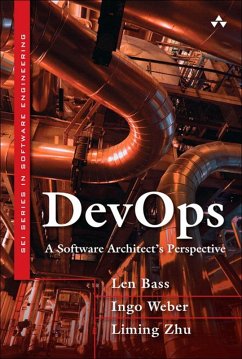DevOps promises to accelerate the release of new software features and improve monitoring of systems in production, but its crucial implications for software architects and architecture are often ignored.
In DevOps: A Software Architect's Perspective, three leading architects address these issues head-on. The authors review decisions software architects must make in order to achieve DevOps' goals and clarify how other DevOps participants are likely to impact the architect's work. They also provide the organizational, technical, and operational context needed to deploy DevOps more efficiently, and review DevOps' impact on each development phase. The authors address cross-cutting concerns that link multiple functions, offering practical insights into compliance, performance, reliability, repeatability, and security.
This guide demonstrates the authors' ideas in action with three real-world case studies: datacenter replication for business continuity, management of a continuous deployment pipeline, and migration to a microservice architecture.
Comprehensive coverage includes
. Why DevOps can require major changes in both system architecture and IT roles
. How virtualization and the cloud can enable DevOps practices
. Integrating operations and its service lifecycle into DevOps
. Designing new systems to work well with DevOps practices
. Integrating DevOps with agile methods and TDD
. Handling failure detection, upgrade planning, and other key issues
. Managing consistency issues arising from DevOps' independent deployment models
. Integrating security controls, roles, and audits into DevOps
. Preparing a business plan for DevOps adoption, rollout, and measurement
Dieser Download kann aus rechtlichen Gründen nur mit Rechnungsadresse in A, B, BG, CY, CZ, D, DK, EW, E, FIN, F, GR, HR, H, IRL, I, LT, L, LR, M, NL, PL, P, R, S, SLO, SK ausgeliefert werden.
Hinweis: Dieser Artikel kann nur an eine deutsche Lieferadresse ausgeliefert werden.


